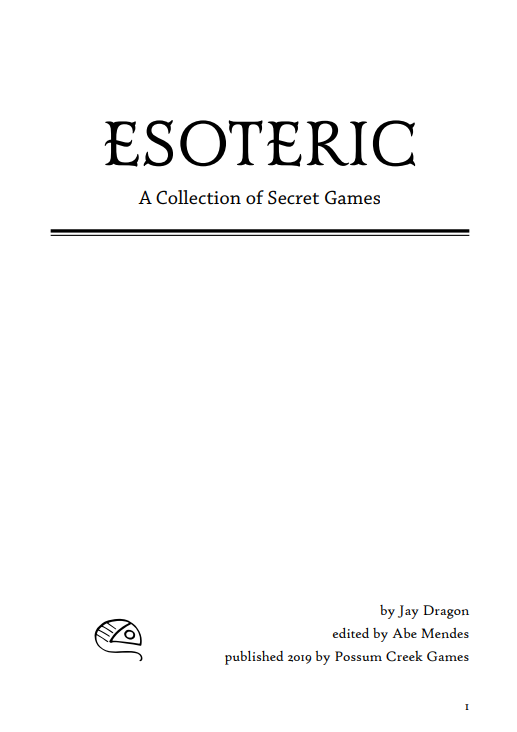I’m on a study project to improve my understanding of roleplaying games. To this end, I already have two reading projects, A Game Per Year and An Adventure Per Year. This is the third, with the goal of reading or playing 52 games made in the last few years. Originally I considered making this “A New RPG Per Week” and that’s where the number 52 comes from, even though a weekly schedule is probably not within my abilities.

Esoteric is a collection of lyric games with a more baroque, elaborate aesthetic than the minimalist lyric games I’ve previously read. It has a foreword saying that the games within: “remember when play was called ritual and games were called gods.”
There’s also an interesting instruction where players are told to avoid describing their play experiences to others. Keeping the experience secret is granted an aesthetic value in itself.
I’m reminded of a book about Freemasons I read once where it was argued that it’s impossible to learn Masonic secrets by reading descriptions of rituals because the secret is experiential. You can only know the secret by participating in rituals in good faith, making it impossible for anyone to know the secret except current and former Masons.
As a roleplayer and larper this kind of definition of secret knowledge is instinctively sensible: It brings to mind all those times I’ve tried to explain the experience to someone who has never played.
The games in Esoteric resemble ritual scripts but they are very word and language based, avoiding the more physical components of ritual design. This makes me wonder about the same question many lyric games rise: Are these for playing or reading?
Or perhaps that’s a boring question. One category in Esoteric is Games of Consumption, the first of which is called Wordhunger. Two partners describe each other, focusing on what can be seen. It feels designed to tear away at people and the bonds that connect them.
Another is called The Breakdown Game in which one participant stands in the center of a circle and seeks to define themselves. Then others ask: “Yes you are, but what else are you?”
And then you continue until the person in the circle breaks apart and the next one steps in.
These are games that can be played but it’s also a fine choice not to play.